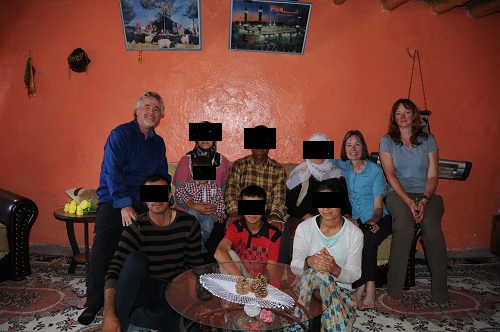
Our Mission: Ararat 2014 team poses with a Kurdish family in eastern Turkey. On the wall above us is a portrait of The Grand Mosque in Mecca. Families will hang photos of sons (usually), who have made the hajj to Mecca. The hajj is one of Islam’s Five Pillars.
In addition to the essential beliefs we looked at yesterday, Islam is a religion involving duties. The obligations are known to Sunni Muslims as “The Five Pillars of Islam” – arkan al-Islam in Arabic. These pillars are foundational in the life of all devout Muslims, although some branches of Islam, like the Shi’a, add several other obligations to Islamic life.
It’s important for Muslims to know the foundation of these pillars because only the good deeds that are described in the writings of the Qur’an or Hadith are said to count toward outweighing their bad deeds on the Day of Judgement. These five basic duties are:
Shahada – Literally meaning “to bear witness,” the shahada is the Muslim statement that affirms the oneness of god, and the validity of Muhammad as his leading prophet. “There is no god but god (Allah),” the saying is recited, “and Muhammad is the prophet of god.” It’s been said that reciting the first half of the shahada simply makes one a monotheist (believer in one god), but reciting the second half is what makes one a Muslim. This phrase, central to Islam, is recited often through one’s life – even whispered into the ears of a newborn baby.
Salat – Followers of Islam are required to pray at five specified times each day. These prayers are known as Salat. Salat is to be performed while facing the holy city of Mecca in Saudi Arabia. Often times Muslims will gather at the mosque to offer their prayers to Allah, although they are also free to pray at their homes or other convenient places on most days. Salat does not typically consist of personal prayers, but rather contains a set of memorized ritual prayers and various physical positions, such as standing, bowing and prostrating oneself. Prior to praying, each person must complete a washing, or purification, known as wudu.
Zakat – Zakat is the practice of giving alms to the Muslim community, which will in turn use these funds for the sick, widows, orphans and other charitable causes, along with administrative needs, building and upkeep of mosques and provision for missionaries. Typically, zakat is done monetarily, although for poorer people this is not always the case. Those who are unable to give financially will often perform zakat by offering good deeds toward others.
Sawm – Although there are different kinds of fasts outlined in the Qur’an, the best known is the ritual fast of Ramadan. During this holy month, Muslims abstain from food and drink (among other “pleasurable” things) during all daylight hours. Fasting is required of all able-bodied men and women. During Ramadan, followers of Islam are taught to put in more effort to obeying the teachings of Muhammad, while focusing on seeking forgiveness from Allah and a greater dependence upon him.
Hajj – The famous pilgrimage to Mecca, known as the Hajj, is the last of the Five Pillars. Similar to zakat and sawm, exceptions are made for those who are physically or financially unable to make the journey, but all other followers of Islam are obliged to make the Hajj at least once in their lives. For most Muslims, this is not as much an obligation as a delight. Every haji (pilgrim) wears two white sheets as a symbol of unity and equality before Allah. During the hajj, every haji will circle the sacred Kaaba seven times, travel seven times between Mount Safa and Mount Marwah, in addition to collecting and symbolically throwing stones at the devil among other traditional Hajj requirements.
Failing to fulfill these fundamental duties of Islam is inconceivable for devout Muslims. Furthermore, such a failure would put one’s standing with Allah in great jeopardy.
That said, however, the Qur’an records that even the prophet Muhammad, whose life and example these pillars rest upon, wasn’t certain of his own eternal destiny.
Muhammad received these words, as recorded in the Qur’an: “I am no new thing among the messengers, nor know I what will be done with me or you” (Surah 46:9).
From these words, we can safely draw the conclusion that a Muslim – even Muhammad – can believe all essential doctrines and fulfill all necessary duties and yet still be uncertain as to whether or not Allah will judge him or her favorably. The Christian, however, has a Rock-solid assurance.
“Most assuredly,” Jesus declares in John 6:47, “I say to you, he who believes in Me has everlasting life.” No worrying. No wavering. No wondering. Not only does Jesus “most assuredly” tell us the path to eternal life, but He is the Life!
Please take a moment and join us in prayer:
- Pray for followers of Islam who are weary and heavy laden with works and rituals. May they come to Jesus and find rest for their souls. May they find His yoke to be easy and burden to be light.
- Pray that Christian believers would be witnesses to the grace of God through Christ. May Muslims see and be deeply moved by the freedom from fear and the assurance of salvation that is only found in Jesus.